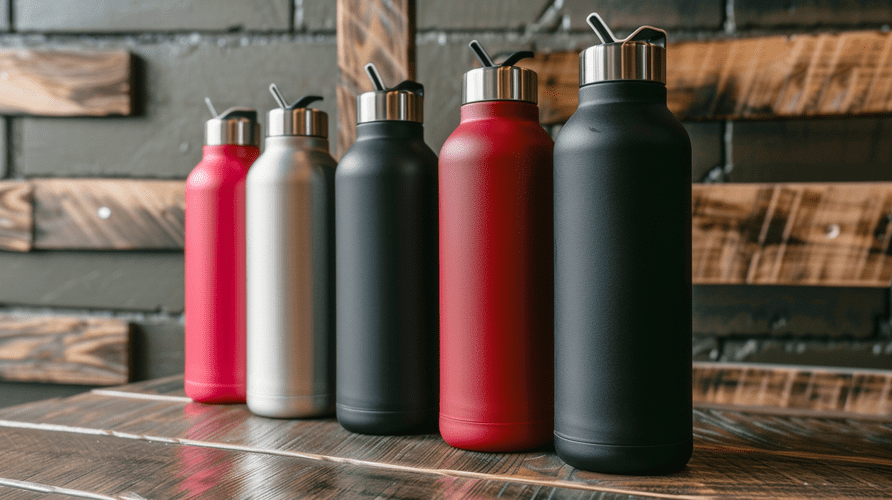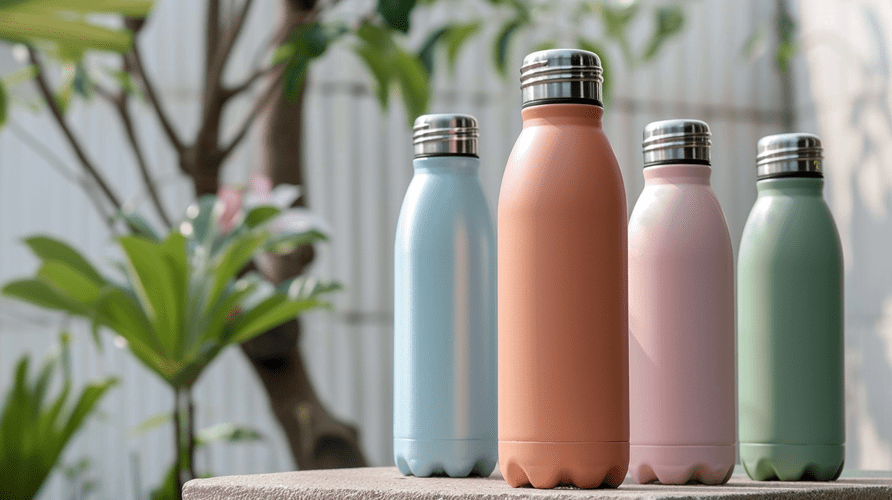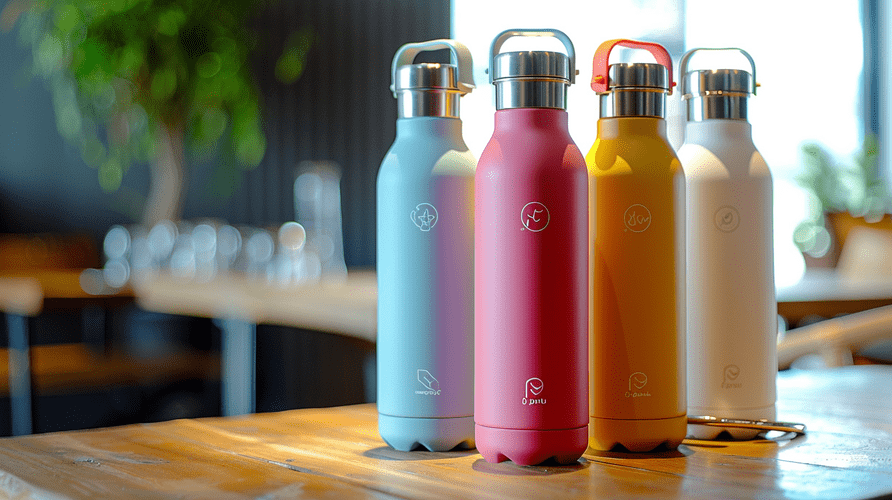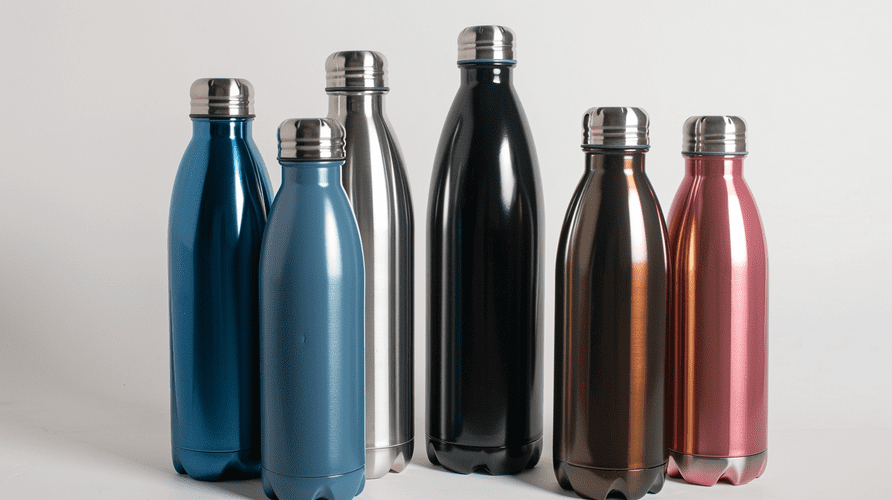Frustrated with flimsy water bottles or concerned about chemicals? Finding a durable, safe, and stylish water bottle that actually keeps your drinks at the right temperature can feel impossible.
The healthiest water bottles are typically made of glass or food-grade stainless steel. These materials are non-toxic and don't leach harmful chemicals into your water. For businesses, offering these safer options is key.

Choosing the right water bottle isn't just about hydration; it's about health, sustainability, and even style. As a B2B buyer, understanding these nuances is crucial for your inventory. Let's explore what makes a water bottle truly great and what pitfalls to avoid, ensuring you stock products your customers will love and trust.
What is the healthiest water bottle to drink out of?
Tired of wondering if your water bottle is leaching harmful chemicals? You need a bottle that ensures your water stays pure and healthy, without any weird aftertastes.
For the purest drinking experience, glass water bottles are an excellent choice as they don't leach chemicals and are infinitely recyclable. Food-grade stainless steel is another top contender, known for its durability and safety.

As a B2B buyer, like Mark Shenng, who values quality, prioritizing health and safety in your water bottle selection is paramount. End-consumers are increasingly aware of the materials they use daily. Offering bottles made from verifiably safe materials isn't just a selling point; it's a responsibility. The primary concern is the material's interaction with the beverage. Food-grade stainless steel, specifically types 304 (18/8) and 316, are industry standards for a reason. Type 304 is common and economical, offering good corrosion resistance for general use. Type 316 contains molybdenum, giving it superior corrosion resistance, especially against acidic drinks or in salty environments, making it a premium option. It's vital that any inner coatings, if present, are BPA-free and don’t alter the taste of the water or beverage. For selling in European markets, LFGB certification is crucial, while FDA approval is key for the US market, confirming the materials are safe for food contact. I always ensure our Icobottle products meet these stringent standards, giving our clients like Mark peace of mind.
Understanding Material Differences:
When I first started in this business, the different stainless steel grades seemed confusing. But understanding them is vital for B2B success.
| Feature | Glass | 304 Stainless Steel | 316 Stainless Steel |
|---|---|---|---|
| Health Safety | Excellent, no leaching | Excellent, food-grade | Excellent, highest corrosion resistance |
| Durability | Can break | Very durable | Most durable, especially against corrosion |
| Taste Preservation | Excellent, no flavor transfer | Very good, minimal flavor transfer | Excellent, no flavor transfer |
| Recyclability | Infinitely recyclable | Recyclable | Recyclable |
| Cost | Varies | Economical | Premium |
| Weight | Can be heavy | Lightweight to moderate | Moderate |
For instance, Mark often orders stainless steel water bottles for his distribution business in Canada. He needs to balance quality with competitive pricing. While 316 stainless steel offers the ultimate corrosion resistance, 304 is generally sufficient and more cost-effective for the everyday water bottles his customers typically purchase. Both are food-safe, but it's a detail that can impact the final price and perceived value. It’s my job to explain these differences so clients like Mark can make informed decisions.
What is the best stainless steel water bottle?
Searching for a stainless steel bottle that’s durable, safe, and keeps drinks at the perfect temperature? It’s frustrating when bottles rust, dent easily, or impart a metallic taste.
The best stainless steel water bottles are made from 18/8 (304 grade) or 316 grade stainless steel. These are food-safe, resist corrosion, and are durable. Features like double-wall vacuum insulation are also highly desirable for temperature retention.

When Mark looks for stainless steel water bottles1, his top priorities are quality and a competitive price point. As a company owner and procurement officer, he’s assertive and knows what he wants. He usually sources from developing countries like China and Vietnam to then rebrand and distribute in Canada. This means the initial product quality is non-negotiable. For Icobottle, this means ensuring every batch meets his, and ultimately his customers', expectations. The "best" stainless steel water bottle for a B2B buyer like Mark is one that reliably uses food-grade 304 or the even more resilient 316 stainless steel. Type 304 (often called 18/8 stainless steel because it contains 18% chromium and 8% nickel) is the workhorse of the industry – it’s robust, resists rust well with typical beverages, and offers good value. Type 316 stainless steel is a step up, with added molybdenum for enhanced corrosion resistance, particularly against salty or very acidic liquids. While 316 is a premium feature, 304 is usually more than adequate and helps keep costs competitive, a key factor for Mark. We also focus on features that appeal to the end-user: double-wall vacuum insulation2 for keeping drinks hot or cold for hours is practically a standard expectation now.
Key Features B2B Buyers Should Scrutinize:
Understanding the technical aspects helps in sourcing superior products. Mark, for example, lacks deep technical expertise but has a keen sense for sales and product quality.
| Feature | Importance for B2B | Details to Consider | Icobottle Standard |
|---|---|---|---|
| Steel Grade | Crucial for safety & durability | 304 (18/8) for general use, 316 for premium/harsh conditions. Avoid 201 steel. | Primarily 304 & 316 food-grade stainless steel. |
| Insulation | High consumer demand | Double-wall vacuum insulation for optimal temperature retention. | Standard in most of our bottle designs. |
| Lid Construction | Affects user experience & safety | Leak-proof, easy to clean, BPA-free materials (e.g., PP, silicone). | Durable, leak-proof, and always BPA-free. |
| Certifications | Market access & trust | FDA for the US, LFGB for Europe. Ensures food contact safety. | We provide products that can pass FDA & LFGB tests. |
| Customization | Branding opportunity | Logo printing, color options, unique designs. | Extensive customization options available. |
| Manufacturer Reliability | Minimizes supply chain risks | Quality control processes (e.g., ISO 9001), transparent communication. | BSCI audited, ISO9001 certified. |
A critical point often overlooked by less experienced buyers is the risk of 201 stainless steel. It’s cheaper, yes, but far less resistant to rust and can leach metals, especially with acidic drinks. This is a corner I’d never cut, as it could damage a client’s reputation. For Mark, who is sensitive to quality, guaranteeing the correct grade is a cornerstone of our business relationship. Ensuring that lids are also made from food-safe, BPA-free materials like polypropylene (PP) or silicone is just as important.
Which water bottles are not safe?
Worried about hidden dangers in your reusable bottle? Many bottles contain harmful chemicals or are made from low-quality materials that can compromise your health.
Water bottles made from non-food-grade stainless steel3 (like 201 grade) or plastics containing BPA or other harmful chemicals are considered unsafe. Low-quality manufacturing can also lead to issues. Always check for material labeling and safety certifications.

Mark's business relies on the trust of his customers, so avoiding unsafe products is a major concern. One of his pain points is encountering suppliers who commit certificate fraud, which can have serious consequences. This is why thorough vetting and transparency are pillars of how I operate Icobottle. Unsafe bottles primarily fall into categories based on material and manufacturing quality. Non-food-grade stainless steel, like type 201, is a big red flag. While cheaper, it has poor corrosion resistance and may leach harmful metals such as manganese, especially when in contact with acidic or salty beverages. This is something we actively educate our clients about. Plastics containing Bisphenol A (BPA) are another major concern, and even "BPA-free" plastics can sometimes leach other unwanted chemicals, especially if exposed to heat (like in a dishwasher or a hot car). The European Union and the USA have regulations concerning BPA, with the EU recently adopting a ban on BPA in food contact materials, with phase-out periods. For hot water bottles, there are specific safety standards like BS1970:2012, which ensure they won't split or leak, preventing burns. Adherence to these standards is non-negotiable for safety.
Identifying Potential Hazards:
Mark's experience with inefficient communication and delayed shipments highlights the need for reliable partners. Ensuring product safety is another layer of that reliability.
| Hazard Category | Specific Risks | How to Avoid for B2B Buyers | Icobottle's Approach |
|---|---|---|---|
| Material Toxicity | Leaching of BPA, phthalates, heavy metals (e.g., from 201 steel). | Demand 304/316 stainless steel; ensure all plastic components are certified BPA-free. Request material test reports. | Strict use of 304/316 steel & BPA-free plastics4. Provide test reports upon request. |
| Misleading Certifications | Fake FDA/LFGB compliance. | Verify certifications with issuing bodies where possible; work with reputable, audited suppliers. | Transparent certification process; factory audits (BSCI, ISO9001). |
| Manufacturing Defects | Improper welds, sharp edges, faulty seals leading to leaks or bacterial growth. | Implement thorough quality inspections pre-shipment. Review manufacturer's quality control protocols. | Rigorous multi-stage QC inspections. |
| Hot Liquid Hazards | For bottles intended for hot liquids, risk of splitting, leaking, burns. | Ensure compliance with specific standards like BS1970:2012 for hot water bottles. | Adherence to all relevant safety standards for intended use. |
| Chemical Leaching from Coatings | Inner coatings that are not food-safe or degrade over time. | Confirm any coatings are food-grade, BPA-free, and durable. | Use only certified food-grade and BPA-free coatings when necessary. |
A common issue I've seen is when a factory tries to cut costs by using 201 stainless steel for parts of the bottle that aren't immediately obvious, or by using lower-grade plastic for lids or straws. This is why quality inspection is one of Mark’s key focuses during purchasing. He knows that a small saving upfront can lead to huge problems down the line, including product recalls or damage to his brand. We ensure transparency by providing detailed material specifications and encouraging third-party inspections if clients wish. The market trend is clear: consumers want safe, reusable, and eco-conscious products. As a B2B supplier, aligning with these values by rigorously excluding unsafe materials and practices is essential for long-term success.
Conclusion
In 2025, the best water bottles prioritize health, durability, and user experience. For B2B success, focus on certified safe materials like 304/316 stainless steel and clear, honest communication with suppliers.
-
Explore this link to discover top-rated stainless steel water bottles that combine durability, safety, and temperature retention. ↩
-
Learn about double-wall vacuum insulation and how it keeps your drinks at the perfect temperature for hours. ↩
-
Understanding the risks associated with non-food-grade stainless steel can help you make informed choices about safe water bottles. ↩
-
Explore the truth behind BPA-free plastics to ensure your water bottle choices are truly safe and healthy. ↩

